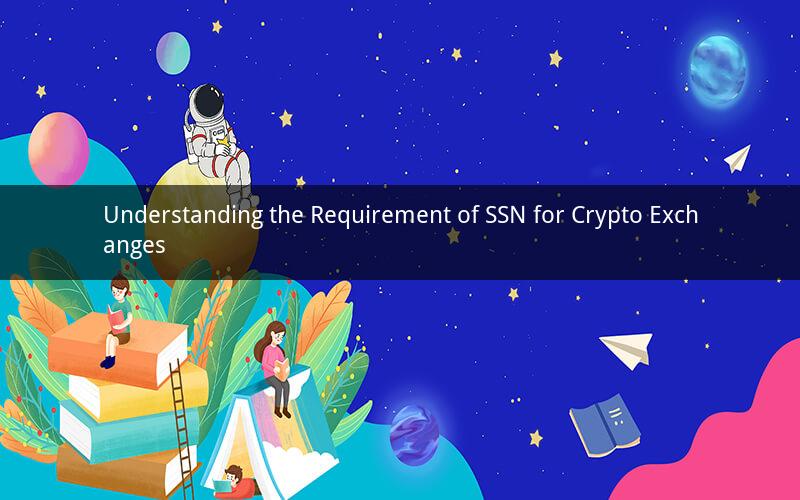
Introduction:
The world of cryptocurrency has been rapidly evolving, and with it, the regulations surrounding these digital assets. One common question that often arises is whether all crypto exchanges require an SSN (Social Security Number) for their users. In this article, we will delve into this topic, exploring the reasons behind the requirement and the variations across different platforms.
1. Why Do Crypto Exchanges Require SSNs?
1.1 Compliance with Anti-Money Laundering (AML) Regulations
One of the primary reasons why crypto exchanges require SSNs is to comply with Anti-Money Laundering (AML) regulations. These regulations are designed to prevent financial institutions from being used for money laundering, terrorist financing, and other illegal activities. By verifying users' identities, exchanges can ensure that their platforms are not being misused for such purposes.
1.2 Know Your Customer (KYC) Procedures
Know Your Customer (KYC) procedures are another reason why crypto exchanges may require SSNs. These procedures involve collecting and verifying information about users to ensure that they are who they claim to be. By obtaining an SSN, exchanges can cross-reference this information with government databases to verify the user's identity.
1.3 Tax Compliance
Tax authorities around the world require financial institutions to report certain transactions involving cryptocurrencies. By obtaining an SSN, exchanges can ensure that they are able to comply with these tax reporting requirements and avoid potential penalties.
2. Do All Crypto Exchanges Require SSNs?
2.1 Yes, Many Crypto Exchanges Require SSNs
While not all crypto exchanges require SSNs, a significant number of them do. This is primarily due to the aforementioned reasons, such as AML regulations, KYC procedures, and tax compliance. Some of the most popular exchanges, including Coinbase, Binance, and Kraken, require users to provide their SSNs for account verification.
2.2 Some Exchanges Have Alternative Verification Methods
While many exchanges require SSNs, there are some that offer alternative verification methods. For example, exchanges in countries like Switzerland and Japan may not require SSNs but instead use other forms of identification, such as a passport or driver's license.
3. How to Provide an SSN to a Crypto Exchange
3.1 Visit the Exchange's Website
To provide your SSN to a crypto exchange, you will first need to visit the exchange's website. Most exchanges have a dedicated page for account verification or identity verification.
3.2 Fill Out the Required Information
On the identity verification page, you will be prompted to fill out a form with your personal information, including your SSN. Be sure to enter the correct information to avoid any delays in the verification process.
3.3 Submit the Required Documents
In addition to providing your SSN, you may also be required to submit additional documents, such as a copy of your driver's license or passport. These documents are used to further verify your identity.
4. Potential Issues with Providing an SSN
4.1 Privacy Concerns
One of the main concerns with providing an SSN to a crypto exchange is the potential for privacy breaches. While exchanges claim to have robust security measures in place, there is always a risk that your personal information could be compromised.
4.2 Identity Theft
Another potential issue is the risk of identity theft. If your SSN falls into the wrong hands, it could be used to open fraudulent accounts or commit other illegal activities in your name.
5. Alternatives to Providing an SSN
5.1 Use a Virtual Private Network (VPN)
One alternative to providing your SSN is to use a Virtual Private Network (VPN) to mask your real IP address. This can help protect your privacy and make it more difficult for exchanges to track your online activities.
5.2 Use a Non-US-Based Exchange
As mentioned earlier, some exchanges in countries like Switzerland and Japan do not require SSNs. If privacy is a major concern for you, you may consider using one of these exchanges.
5.3 Use a Pseudonymous Account
Some exchanges offer pseudonymous accounts, which allow users to trade cryptocurrencies without providing any personal information, including an SSN. However, these accounts may come with certain limitations, such as reduced trading limits or access to certain features.
Conclusion:
While many crypto exchanges require SSNs for account verification, it is essential to understand the reasons behind this requirement and the potential risks involved. By being aware of these factors, you can make an informed decision about whether to provide your SSN or explore alternative verification methods to protect your privacy and security.